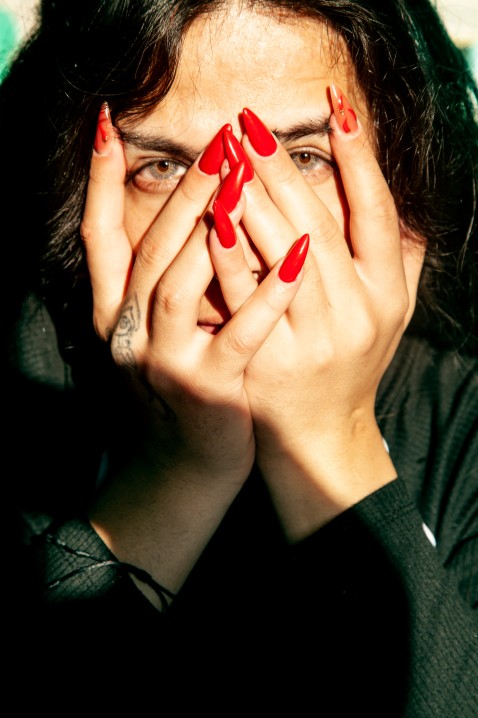Loujain / Lebanon, Omar Gabriel, Syria
“I Don’t Want to Talk About My Mother.
What to wear to the party tonight? I’m thinking of a sexy black dress. Some shiny stockings would go perfectly with it. Or maybe my sequin skirt with a plunging top. What about the shoes? I need my shoes to be glamorous. And my makeup. And my hair.
I’m going to look stunning. We are going to have a blast.
I felt fabulous. I was fabulous. The music was perfect, my favorite Arab pop songs were being played, people were dancing, being themselves, free, happy, the mood was perfect. Until, suddenly and in a blink of an eye, all that vanished into thin air. Furious police officers barged in, and the music was replaced by their enraged voices screaming at us at the top of their lungs, calling us names, using the most abusive language you could ever think of, asking us to disperse and align. “Face to the wall!”, “Legs spread!”, “Hands up!”. No one had time to run, to even think or breathe. How did it come to this? For a moment there, I had forgotten I was in Syria and that just being there was illegal. All I can remember after that is being on the floor and men in official suits beating me up. Next, I’m in prison.
It’s dark, filthy, and humid. The smell of long-settled pain and fear goes straight up to your head, pierces your bones, and creeps into your soul. And when you’re not being beaten up, you are hearing the shrieks of others, your friends, people you know being battered and tortured.
Angry voices, insults, shaming, derogating name-calling: “What were you doing in that place? Do you organize parties like this often? Why are you dressed up as a woman? Give us names of others who do the same!”
You must give them the answers they want to hear to stop the beating. But the truth is that we were just dancing, and they are not parties “like this”; they are just parties, and I am not dressed up as a woman; I am a woman, and I don’t know others who “do” the same; I know others who suffer the same way.
Three months in a prison cell.
Why am I here?
What’s my crime?
Who owns the rights to my body?
Clearly not me.
Every person thinks they have a say in who I can or cannot be. They believe they are entitled to my body. To restrain it, to beat it, to abuse it, to take what I have. What can you do when your mere existence is unlawful? Outlaw by no choice or decision of mine.
My father beat me up, and my brothers too. They stripped me of all my belongings and tied me up in chains. Men in the streets beat me up. They force themselves into my home, attack me and steal my things. And there is nothing I can do about it. Any crime against me is left unpunished. If anything, I am the one who ends up in jail.
Tyrannical systems want to break anyone who doesn’t fit in their frame. They want to replace your dignity, freedom, and right to disagree with humiliation, obedience, and submission.
I was forced to run the streets; I became a sex worker. I had to make enough money to run away from Syria. I thought living in Lebanon would be better for me, that society here would be more tolerant and the laws more malleable. But, in fact, the situation here is not very different. The struggle keeps going on, despite the progressive sense Lebanon conveys.
Still, I have to think of every move I make. Still, I am forced to live apart from the man I love because society cannot bear the thought of us living under the same roof. Still, I have to suffer aggression and humiliation for who I am. Still, I have no laws to protect me.
But I know I’m a human being. And I’m a good human being. And I know I deserve to be treated as one, to be respected as one. I no longer want to live in fear, fear of persecution, of stigma, of physical abuse, of becoming homeless, of not having a job, of feeling that I have to jump from the balcony every time someone knocks on my door, or a failed suicide, lest I make things worse. I can no longer tolerate being an oppressed body in the grip of some tyrannically structured authority.
I dream of feeling safe in my home and on the streets, to live in dignity and enjoy the simple things in life.
The sacrifice is too big and too heavy. But I am willing to face it all, being torn from my family, my home and everything familiar to me. I told you before, I don’t want to talk about my mother. It’s just too painful, and I can’t go on if I keep crying. But I refuse to live a lie, and I am willing to take on that excruciating journey. I am who I am, and I shouldn’t have to change. I choose the truth, against all odds and at any cost. I choose life; the way it should be.”




